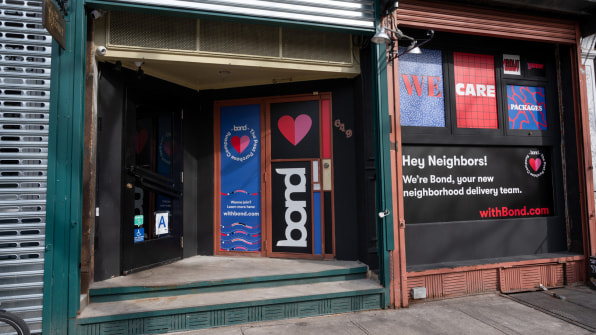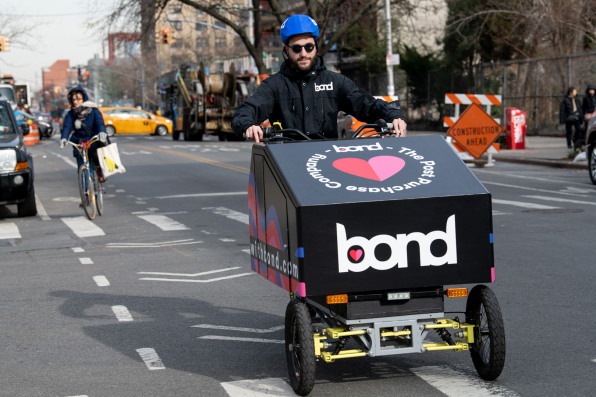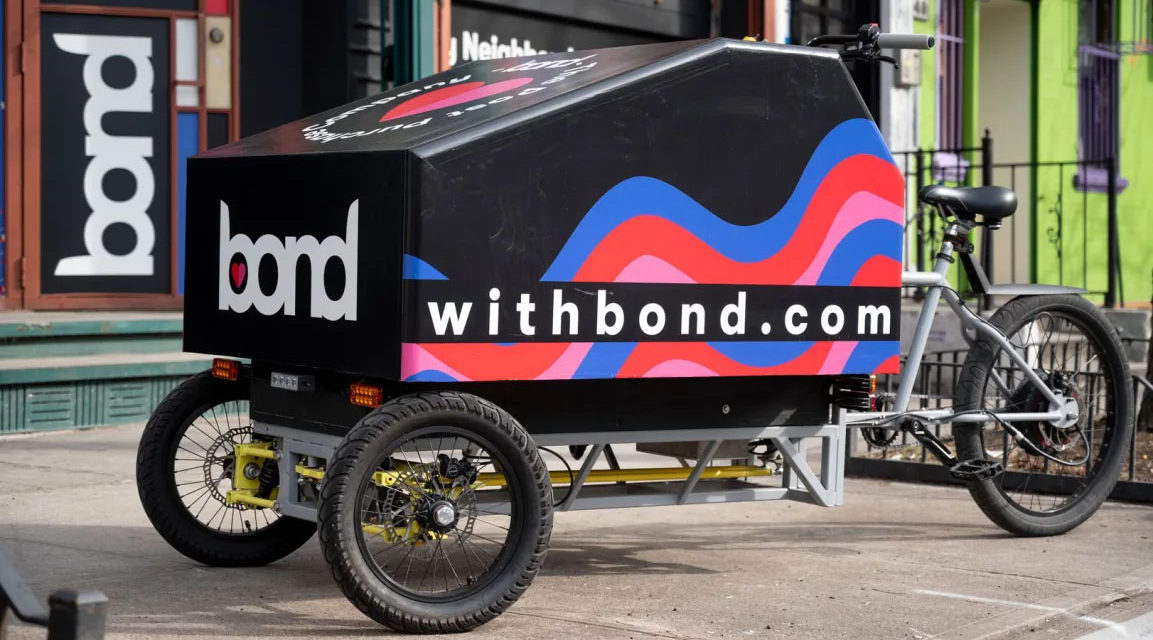[Photo: courtesy Bond]
BY ADELE PETERS
Source: www.fastcompany.com, January 2020
Bond is opening a series of small warehouses in basements and storefronts to do delivery differently than the big carriers, in the hopes of making urban delivery quicker and lower-emission.
If you walk down Lexington Avenue in Midtown Manhattan, you might see a brightly striped cargo trike leave a small storefront. The location is one in a growing network of “nano distribution centers,” serviced by the electric vehicles, owned by a startup called Bond. Bond doesn’t sell anything itself. Rather, it’s a new urban shipping company that wants to make online shopping both more sustainable and less annoying for customers.
When someone in the neighborhood places an order in the morning with one of the brands working with the service, they can get a delivery the same afternoon—and schedule the time that the local bike courier will arrive with the package, chatting in real time with the courier, if needed. If someone misses a delivery, the package will go back to the storefront rather than a more distant distribution center. Returns can also be scheduled for pickup.

The company is working with brands that offer perishable goods, like Wild Alaskan Co., a retailer that ships wild salmon and other fish from Alaska, and Rose Box, which ships fresh flowers, along with others that sell consumer electronics, cosmetics, and other products. The company is in talks with some larger brands, as well. Customers place orders on the brand’s website or app and can schedule delivery there.
The company looks at data to determine how much stock that a neighborhood needs of a particular product in each tiny distribution center. “We’re calculating demand within hyperlocal territories,” says Asaf Hachmon, Bond’s CEO. “And based on this calculation, we know how much supply or how much inventory needs to be held in each one of these nano distribution centers.” The system means that brands can avoid the carbon footprint of sending packages next-day air on planes. Ohi, another startup working with online brands, is using a similar model.

It also means that delivery inside the neighborhood can be much more efficient. At night, when roads are clear, trucks make larger deliveries to the distribution centers. During the day, when streets are crowded, the small cargo trikes can avoid the pollution of trucks or vans stuck in traffic, and can operate more nimbly, making deliveries faster. The company has calculated that one of the logistics companies that it works with has reduced its use of trucks by 22%.
The startup, which announced $15 million in new funding today, grew out of an online grocery service in Tel Aviv called Shookit. At first, the delivery company was struggling with the cost of its delivery. “We dug deep into the data and saw that 30% of our logistical cost was from getting to the neighborhoods, and the other 70% was being spent around the neighborhoods because of reasons like inefficient proof of delivery, traffic jams, and parking tickets,” says Hachmon. Shookit decided to experiment with storing its inventory directly inside neighborhoods instead of using more traditional warehouses and then use electric trikes, and saw that it worked: deliveries were more efficient, and customers were so much less frustrated with delivery times that customer retention increased 60%. The founders decided to spin off Bond to work with other brands that were struggling with the typical problems of online delivery, like missed packages.
Bond can deploy its distribution centers in basements, unused space in office buildings or parking garages, or, somewhat ironically, storefronts that may now be empty because neighborhood stores were pushed out of business by online shopping. It’s worth wondering whether “nano distribution centers” may someday evolve back into the concept of neighborhood stores—but for now, it’s a model that more online retailers and logistics companies are beginning to adopt. In some European cities, UPS brings shipping containers into city centers early in the morning, and then couriers on electric trikes start making deliveries; the company, along with Amazon and others, is also beginning to test cargo bike delivery in New York City from in-city locations.
Bond has six distribution centers in Manhattan and Brooklyn, and plans to deploy as many as 30 more in the coming months; most serve customers within roughly a mile radius. It also plans to launch in additional cities later this year. “I believe that within the upcoming month or two, you’ll be able to see these tricycles running around Manhattan every day,” says Hachmon.

